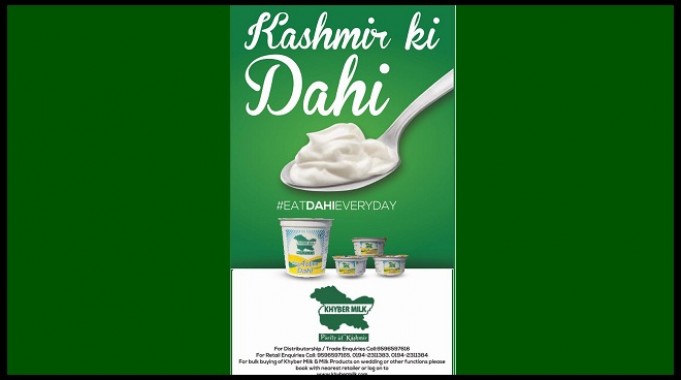Kashmir’s cronyism means a news blackout
Don't bite the hand that feeds: a Khyber ad in Greater Kashmir
Srinagar: The Budgam court convicted Kashmir’s leading business house Khyber Agro Farms Private Limited for selling adulterated milk in the Valley on April 4, the day Mehbooba Mufti was sworn in as Chief Minister. But while her oath-taking was understandably covered extensively, the verdict was not.
The court imposed a Rs 9 lakh penalty and sentenced the companies nominee to six months in jail, after a laboratory examination detected the presence of detergent in its toned milk sample taken from Budgam district in 2013. “This is not first case where it has come to the surface that the milk product manufactured by (Khyber) company contains detergent, urea and other dangerous chemicals not only in milk but other products,” the court said.
Three prominent Kashmir dailies such as Greater Kashmir, Kashmir Reader and Rising Kashmir failed to report the court verdict against Khyber. Greater Kashmir did however carry an advertisement for Khyber Milk on page 3, indicating the business interests of the states largest circulated newspaper.
All the three newspapers (including Kashmir Reader, where I work) receive a fair share of advertisements every month. So it becomes obvious how Kashmir's fledging corporate sector is controlling the media.
A senior editor at Greater Kashmir who wanted anonymity, said it was “criminal” on the part of newspapers to refuse to carry news that is in the public interest. “Obviously, we did not carry it because of business interests,” he said.
Greater Kashmir printer and publisher Rashid Makdoomi said he did not know why that story was not carried because he was not in town.
Rising Kashmir Editor-in-Chief Shujaat Bukhari said he too was out of town and knew nothing about it.
Kashmir Reader Editor-in-Chief Hayat Bhat said they did not carry the news because only one brand was being targeted and declared as unsafe.
“We thought it is someone’s conspiracy to discredit the brand and company (Khyber). Why are samples of other brands not being checked? There are spice companies who don’t follow set criteria but no action is being taken against them,” he said.
The trail of food adulteration by Khyber goes back to the year 2013 when news organizations gave almost similar treatment to the story as today. A journalist, Junaid Nabi Bazaz, who was working with the Authintmail at the time said the online portal broke the news story about it but the majority of news organization either skipped it or twisted the facts.
"Authintmail, an online portal, broke the story in 2013 about milk adulteration by Khyber. While Greater Kashmir carried the story some days later, they did a story against the then SMC health officer," said journalist Junaid Bazaz. The SMC official was the one who had given details about the food adulteration to the media.
At that time too, most of the newspapers skipped the story or gave a different twist to it, he said.
Oddly enough, perhaps not being aware that milk adulteration is a cause of the rising number of cancer cases, Greater Kashmir last month carried a series of front-page stories about food adulteration and the rising incidence of cancer in Kashmir. It received applause for taking this issue up and the High Court also noted its news reports.
Quoting The Indian Express, the Indian Council of Medical Research in one of its reports has said detergents (including caustic soda) cause food poisoning and gastro-intestinal complications. It said the effect of drinking adulterated milk containing urea, caustic soda and formalin causes ‘gastroenteritis’ but the long-term effects are known to be far more serious.
Yet these facts that the public need to know are conveniently ignored when the need to report them clashes with other interests. A Srinagar-based legal correspondent wishing anonymity lamented the owner-driven newspapers and said he was told at the very beginning that the story will not be carried.
“Still, I filed it and ensured to pass on to news desk. But the newspaper owner, who has business interest with Khyber, directed the desk not to carry it,” he said.
Netizens also poured out their anger against the newspapers and taunted them on social media. Sheikh Saleem Bin Ahmed, who covers court proceedings in the Valley, wrote on Facebook, “Through its milk product, Khyber poisons Kashmir and then treats them at their hospital (Khyber Hospital). This is how their show goes on... God bless this nation.”
Research scholar Basharat Ali said, “The story on Khyber Agro, who have been selling detergent as toned milk, is missing from almost all major English newspapers of Kashmir.’’
On its part, Khyber Agro Farms Managing Director Abdur Rouf Tramboo said he would not comment now. “We will soon clarify our stand. We will see what the law allows us to comment because the case is in the court,” he said.
After the court order, the government is also considering shutting down the company or taking Khyber products off the shelves until a laboratory declares the milk safe for consumption.
J&K government’s Secretary Health and Medical Education, Dr M. K. Bhandari, told a local news agency CNS: “Within a day or two we will initiate action against the accused company. Either we will close the company or its product will be taken out of the market.”
Moazum Mohammad reports for the Kashmir Reader. He has previously worked for the Pioneer and the Millennium Post.
